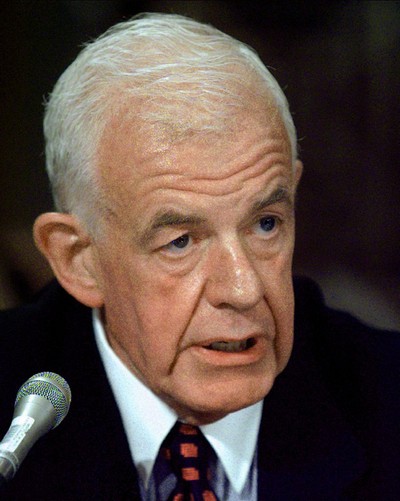Tom Foley (Tom Foley)

Foley was born in Spokane, Washington, the son of Helen Marie (née Higgins), a school teacher, and Ralph E. Foley, a Superior Court Judge. He was of Irish Catholic descent. In 1946, he graduated from the Jesuit-run Gonzaga Preparatory School in Spokane. He went on to attend Gonzaga University in Spokane and the University of Washington in Seattle, the latter awarding him a Bachelor of Arts degree in 1951. In 1957, he earned a law degree from the same university.
Following law school, Foley entered private practice. In 1958, he began working in the Spokane County prosecutor’s office as a deputy prosecuting attorney. Foley taught at Gonzaga University Law School (in Spokane) from 1958 to 1959. In 1960, he joined the office of the State of Washington Attorney General. In 1961, Foley moved to Washington, D.C., and joined the staff of the United States Senate Committee on Interior and Insular Affairs as assistant chief clerk and special counsel, in which capacity he served until mid-1964 when he quit to run for Congress.
In 1964, Foley was unopposed for the Democratic nomination for Washington’s 5th congressional seat, which included Spokane. He faced 11-term Republican incumbent Walt Horan in the general election and won by seven points, one of many swept into office in the Democratic landslide. He was re-elected without significant difficulty until 1978, when he narrowly defeated conservative activist Duane Alton. The next race in 1980 was also close, when physician John Sonneland finished just 4 points back. Though the fifth district became increasingly conservative, Foley didn’t face serious opposition again until his defeat in 1994. In 1981, Foley was chosen majority whip by the House Democratic caucus and served in that capacity until 1987, when he moved up to the position of majority leader. In 1989, Jim Wright of Texas stepped down as Speaker of the House amid an ethics scandal, and Foley was elected to succeed him. He became the first Speaker from a state west of the Rocky Mountains.
During his time in the House, Foley repeatedly opposed efforts to impose term limits on Washington state’s elected officials, winning the support of the state’s voters to reject term limits in a 1991 referendum. However, in 1992, a term limit ballot initiative was approved by the state’s voters. Foley brought suit, challenging the constitutionality of a state law setting eligibility requirements on federal offices. Foley won his suit, with federal courts declaring that states did not have the authority under the United States Constitution to limit the terms of federal officeholders.
However, in Foley’s bid for a 16th term in the House, his Republican opponent, George Nethercutt, used the issue against him, repeatedly citing the caption of the federal case brought by Foley, “Foley against the People of the State of Washington”. Nethercutt vowed that if elected, he would not serve more than three terms in the House (but ultimately served for five terms). Foley lost in a narrow race that coincided with the Republican electoral triumph of 1994. While Foley had usually relied on large margins in Spokane to carry him to victory, in 1994 he won Spokane by only 9,000 votes, while Nethercutt did well enough in the rest of the district to win overall by just under 4,000 votes. At the time, it was reported that some voters believed mistakenly that if he beat Foley, Nethercutt would become the new speaker of the House. Foley became the first sitting Speaker of the House to lose his bid for re-election since Galusha A. Grow in 1862. He is sometimes viewed as a political casualty of the term limits controversy of the early 1990s. President Bill Clinton attributed his defeat to his support for the Federal Assault Weapons Ban of 1994.
In 1997, Foley was appointed as the 25th U.S. Ambassador to Japan by President Bill Clinton. He served as ambassador until 2001. Foley was a Washington delegate to the 2000 Democratic National Convention. On July 9, 2003, Washington Governor Gary Locke awarded the Washington Medal of Merit, the state’s highest honor, to Foley. He was North American Chairman of the Trilateral Commission.
Foley died at his home in Washington, D.C. on October 18, 2013, following months of hospice care after suffering a series of strokes and a bout with pneumonia. He was 84 and is survived by his wife, Heather. He had been experiencing aspiration pneumonia. Services were held at St. Aloysius Church at Gonzaga University, as well as Washington, D.C. Speaker John Boehner, and Nancy Pelosi, who also served as Speaker, issued statements honoring Foley. In a White House statement, U.S. President Barack Obama called Speaker Foley a “legend of the United States Congress” who “represented the people of Washington’s 5th district with skill, dedication, and a deep commitment to improving the lives of those he was elected to serve.”, going on to praise him for his bipartisanship and subsequent ambassadorial service under former President Clinton. Vice President Joseph Biden also released an official statement, saying “Tom was a good friend and a dedicated public servant.”, citing his work in Congress with Foley in the 1980s on budgetary issues. Washington Governor Jay Inslee also released a statement, acknowledging his efforts to reach consensus and emphasize mutual common ground, and his work in the legal system and in Congress, in these capacities serving the state and the Spokane, Washington area. Former President George H. W. Bush, whose presidential term overlapped Foley’s service as Speaker, stated he “represented the very best in public service- and our political system” and “never got personal or burned bridges.”
Born
- March, 06, 1929
- USA
- Spokane, Washington
Died
- October, 18, 2013
- USA
- Washington, D.C.


